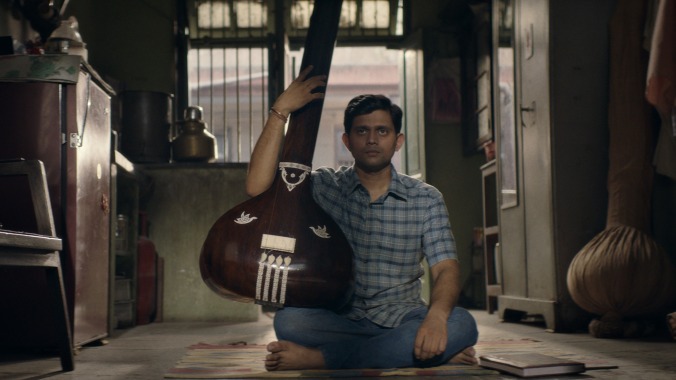The Disciple is a smart, wry drama about the pitfalls of following your dreams


Too many movies feel like they were written by guidance counselors. “Believe in yourself, and you can do anything,” they insist, cheerleading for aspiring artists, athletes, and astronauts. But what if what you want to do with your life is notoriously difficult? And what if you’re just not that great at it? The Disciple, a wry and perceptive new drama from the Indian filmmaker Chaitanya Tamhane, shows what following your dreams looks like when those dreams are lofty on an almost historical scale. It could just as easily be called The Discipline, for how rigorously it privileges the Sisyphean labor of music: the long hours, the waiting and wanting to get better, the tireless devotion you hope will lead to expertise and gigs and maybe acclaim. It’s about pushing the boulder of a calling when there’s no guarantee of glory at the top of the hill.
An elderly man sits cross-legged before a microphone. He is performing a raga for a crowd modest in size and enthusiasm. His voice rises and shifts, each note an improvisation. His hands flutter as elastically as his vocal chords. As the camera slowly pushes in, its focus seems to subtly settle—but not on the main performer. It’s the younger man seated behind him, over his left shoulder, hand grasping a tanpura, who steals our attention. This is Sharad Nerulkar (Aditya Modak), 24-year-old protégé of the singer, and some two minutes into The Disciple, right there in its opening scene, we know what drives him and what will drive the movie. It’s written all over his face, in the awe and admiration and envy. We can almost hear it, like a heartbeat under the drone.
Sharad lives and breathes Khayal, the classical music he obsessively trains to perform. By day, this Hindustani singer absorbs the wisdom of his aforementioned mentor, the often brutally honest Guruji (Arun Dravid). By night, he zips around Mumbai on his motorbike, listening to the recorded lectures of Maii (Sumitra Bhave), a legendary musician who once tutored his father. “It cannot be learnt so easily,” she warns of the music he cherishes. “Even 10 lifetimes are not enough.” In truth, the obscurity and harsh learning curve are part of the appeal for this very serious young man. He is a wonk and a purist, turning his nose up at the “annual-membership types” who tourist in his genre of choice and a singing-competition contestant who trades out her traditionalist style for a Bollywoodized makeover. But as the Salieri of Amadeus could attest, appreciating great art doesn’t mean you can create it.
Speaking of F. Murray Abraham: One can only imagine what his Bud Grossman might say of Sharad, a Llewyn Davis of another decade, country, and musical tradition. The young man has ambition, but does he have it, the intangible and unclassifiable mojo of talent, which can’t be faked or rushed? “The music has no life to it,” his mentor tells him, his feedback as wounding as the expletives (and metal chairs) hurled by J.K. Simmons in Whiplash, a more intense but likeminded movie about the perhaps futile pursuit of perfection in a style of music that’s passed largely out of vogue. And this is after Sharad has achieved some measure of success—The Disciple, as we find out, will span years in his life, and his most triumphant performance is more a hill before a valley, the rush of validation it provides fueling more effort rather than triggering any formulaic rise to fame. Plus, is fame even obtainable? Sharad could be brilliant and still toil in obscurity. His idols, after all, are cult figures at best, unappreciated in their own time and slowly forgotten after it.
Tamhane, the writer-director, made a splash with Court, which explored the injustices of the Indian legal system while getting granular on the day-to-day of a few basically decent people working within it. He has an eye for the macro and the micro. Here, he turns it on a single character, painting his life in quick, observant brushstrokes, often through carefully composed shots that convey volumes of cultural, emotional, or psychological information. Flashbacks illuminate the origins of Sharad’s passion (they’re rooted in his relationship to his father, a failure in the field) without stooping to pat psychoanalysis. Tamhane is neither sentimentalist nor sadist. His empathy peeks through every humiliation and disillusioning moment, from a brief but mortifying on-stage scolding to the small masterpiece of a scene where a pompous music writer (Prasad Vanarse, offering one of the most credible depictions of an asshole critic ever put on screen) casually shatters Sharad’s mythologizing hero worship. Some exquisite dry humor helps the pill go down smoother.
There’s something a little single-minded about The Disciple. Like its protagonist, it keeps its eyes on the prize, tracking him down a long road of professional indignities and minor victories. (Tamhane breaks from sobering reality only once, and it’s for an even harsher alternative: a nightmare that looks at first like a memory, vocalizing all of Sharad’s deepest fears and insecurities about what he’s chosen to do with his life.) But Modak lends the journey a real emotional texture, accumulating a downbeat understanding—and some extra pounds—as the years add up faster than the accolades. It’s a credit to his subtle but expressive performance that we can see faint flickers of that awed kid, beaming from the shadow of greatness, in the resigned man he becomes. Also, for all the fascinating insight the film provides into a musical subculture passing slowly into the archives of history, its melancholy is more universal: Anyone who’s ever devoted themselves fully to a passion, only to discover that the rest of the world barely gives a shit, will smile sadly with recognition.